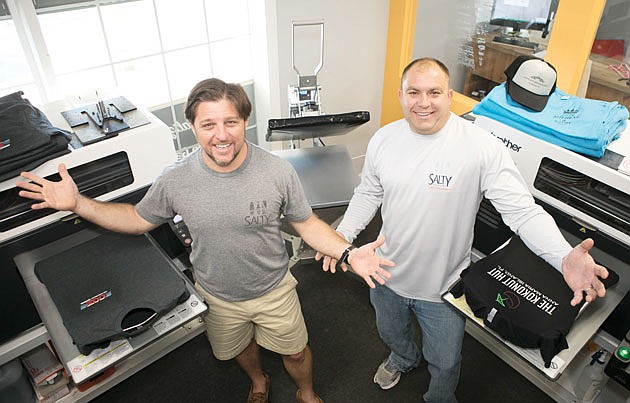- November 23, 2024
-
-
Loading

Loading

Larry Cavalluzzi discovered a problem in 2015, two years after he sold a lucrative sign business: He couldn't find anyone who would make a small batch of high-quality T-shirts for his son's Little League Baseball team.
A short time later a friend, who knows Cavalluzzi from when the entrepreneur ran Sarasota-based SignZoo, asked for advice on finding a company that would do a run of shirts with no minimum. Cavalluzzi again came up empty.
That led Cavalluzzi, who ran SignZoo from 2000 to 2013, to realize there was an opportunity in the unfilled demands. “I just kept running into obstacles for small orders,” Cavalluzzi says, “so I started thinking if there's this need out there...”
Partnering with friend and Bradenton entrepreneur Eric Grimes, Cavalluzzi believes the answer is in Salty Printing Custom T-shirts and Apparel. Salty's solution? It starts with building a franchise network of T-shirt stores that have the combined scale, buying power and centralized processes to raise the profit margins on no-minimum shirt runs. “We are building a business where the individual small guy will have access to everything the big guys have,” says Grimes, who has worked in the sign industry and ran a dental lab company.
Cavalluzzi compares Salty's strategy to Clockwork Home Services. That Sarasota-based franchise company oversaw three home services brands, in heating and air, plumbing and electric. The individual franchisees worked on the service side, their expertise, while Clockwork created a centralized hub for systems and processes. Clockwork grew to more than $200 million in annual sales, with dozens of successful franchisees, before it was acquired in 2010.
Clockwork was a SignZoo client, and Cavalluzzi got to know some of the executives. That was on his mind when he and Grimes dug into the T-shirt business. “There are a ton of great T-shirt guys out there,” says Cavalluzzi. “But not all of them are good at doing business.”
After Salty has scale, say the executives, who have self-financed the venture to this point, the network will be paired with Salty's state-of-the-art digital, direct-to-garment printing equipment. That raises the quality of the shirts — in an industry where quality is sometimes an issue.
Another integral component to the Salty model, says Cavalluzzi, is to streamline options for customers, with a less-is-more approach to shirt styles and makes. That cuts down on expenses, and he believes it's more customer-friendly to be simple and consistent than offer catalogues of hundreds of options.
A final key to the strategy is what Cavalluzzi and Grimes say is a unique e-commerce model: Salty will create an online store for clients, so people who want to buy shirts from their CrossFit gym, for example, can do that easily, with the order going directly to Salty. Says Cavalluzzi, “We want to revolutionize the way people buy T-shirts.”
But first Salty needs to build scale that makes no-minimum batches profitable. So far, the partners have two corporate stores, one on Cortez Road in west Bradenton and another in Sarasota, across the street from the Westfield Siesta Key mall. The first franchise location is scheduled to open in January on State Road 70 in east Manatee County. Cavalluzzi and Grimes, with some partners, also operate a centralized shirt processing center in Palmetto.
Salty has two franchise models. One is to sell a straight-up Salty franchise to new T-shirt store entrepreneurs. That comes with a $35,000 fee and 7% royalties. Salty also plans to offer free franchise deals for existing T-shirt stores, which, like some of Clockwork's franchisees, seek a different approach. The latter model, says Grimes, is partially how Salty will hit his lofty projection of 35 stores in three years or less and achieve the necessary scale.
The Salty partners are in discussions with multiple potential franchisees in St. Petersburg, Clearwater Beach and Cocoa Beach, among other locations. “The more we get, the more everyone's costs go down,” says Grimes. “We can put processes in place that give the small guy a chance. That's the win for us. I feel like this model saves the independent T-shirt shop.”